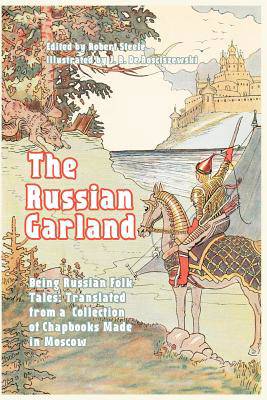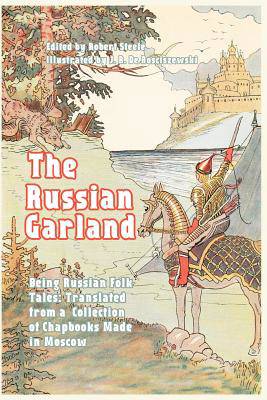
- Afhalen na 1 uur in een winkel met voorraad
- Gratis thuislevering in België vanaf € 30
- Ruim aanbod met 7 miljoen producten
- Afhalen na 1 uur in een winkel met voorraad
- Gratis thuislevering in België vanaf € 30
- Ruim aanbod met 7 miljoen producten
Zoeken
The Russian Garland
Russian Folk Tales: Translated from a Collection of Chapbooks Made in Moscow
Robert Steele
Paperback | Engels
€ 37,95
+ 75 punten
Uitvoering
Omschrijving
Color edition. Edited by Robert Steele. Illustrated by J. R. De Rosciszewski. A selection of some of the very best traditional Russian Folk Tales, translated from the original peasant chapbooks dating from 1830s Moscow by famed medievalist Robert Steele. The broad range of the fairy tales-some similar to, but others vastly different from, their Western European equivalents-is superbly captured in this collection, which includes such tempting titles as "The Mild Man and His Cantankerous Wife," and the "Story of the Most Wonderful and Noble Self-Playing Harp." As Steele notes in his introduction, some of the tales are obviously of German origin-adopted and made Russian, like that of the "Seven Simeons" or "Emelyan, the Fool," while others are as evidently Eastern. A few date from the Russian Epics, like that of "Iliya of Murom" and "Ivan the Peasant's Son;" others are of later date, like that of "The Judgment of Shemyaka," who was a historic character who lived about 1446. This delightful collection also offers a fascinating-and refreshing-look into classical Russian culture and folklore, as the editor pointed out: It is hardly necessary to dilate on the peculiar expressions here to be found; how that a child grows "not day by day, but hour by hour," how that when the Tsar wants to drink, "beer is not brewed nor brandy distilled," seeing he is served at once, how the hero passes through "thrice nine lands to the thirtieth country," how brothers are always in threes, and how the youngest always succeeds where his elders fail. Students of folklore will know all about them, and the rest of us must take them on trust. Do you know why you must never go under a ladder?
Specificaties
Betrokkenen
- Auteur(s):
- Uitgeverij:
Inhoud
- Aantal bladzijden:
- 140
- Taal:
- Engels
Eigenschappen
- Productcode (EAN):
- 9781389485992
- Verschijningsdatum:
- 25/08/2024
- Uitvoering:
- Paperback
- Formaat:
- Trade paperback (VS)
- Afmetingen:
- 152 mm x 229 mm
- Gewicht:
- 263 g

Alleen bij Standaard Boekhandel
+ 75 punten op je klantenkaart van Standaard Boekhandel
Beoordelingen
We publiceren alleen reviews die voldoen aan de voorwaarden voor reviews. Bekijk onze voorwaarden voor reviews.











